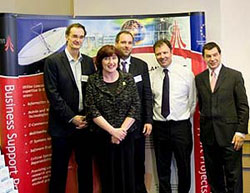Recent Stories
- Businesses urged to tap into science and technology young talent
- Digital relay baton enables remote crowd cheering of athletes
- Health Innovation Campus moves a step closer
- £7.1 million R&D boost for North West businesses
- Centre of excellence created for the next industrial revolution
- Artificial intelligence toolkit spots new child sexual abuse media online
- Strategic partnership set to help plug cyber security skills gap
- What your choice of smartphone says about you
- InfoLabTree: Discover the Story
- novi.digital Launch Event - 'An Event to Help Businesses Grow Online'
RSS Feeds
RSS feeds can deliver the latest InfoLab21 news and events direct to your browser without you having to visit the website.
In most browsers you can click on an RSS link and choose to subscribe to the feed to add it to your favourites or bookmarks.
Jack Straw Praises InfoLab21 Collaboration
Story supplied by LU Press Office
 Dr Gerd Kortuem, Geraldine Smith MP, Prof Nigel Davies, the MD of In Touch John Walden, Nigel Griffiths MP
Dr Gerd Kortuem, Geraldine Smith MP, Prof Nigel Davies, the MD of In Touch John Walden, Nigel Griffiths MP
The Leader of the House of Commons Jack Straw MP has praised Lancaster University for its record of working with business.
He was speaking in the House of Commons on October 26 where he stated:
"The huge increase in developments and in co-operation between universities and business over the past few years, including in Lancashire and by the University of Lancaster, has been impressive."
He was responding to a call for a debate by the Morecambe and Lunesdale MP Geraldine Smith into how to encourage universities to collaborate with local companies.
Along with the Deputy Leader of the House Nigel Griffiths MP, she recently visited ICT firm In-Touch Ltd in Morecambe.
She told the House: "That company is at the cutting edge of technology and works in close collaboration with Lancaster University, which has received substantial sums of money from the Government to encourage it to work with local businesses. That is good and we need to do much more of that."
In-Touch Limited have benefited from a Knowledge Transfer Partnership with InfoLab21. Knowledge Transfer Partnerships are designed to help businesses access expertise and apply it to their business by working in partnership with academics or researchers on a specific project.
For more information see www.ktponline.org.uk/companies
or contact Nick King or Colin McLaughlin for potential ICT related KTP projects.
White Finger Syndrome
In Touch Ltd develops mobile data systems for use in the workplace. During the MPs' visit to the firm, computer experts from Lancaster University demonstrated new technology to prevent vibration "white finger" syndrome which affects more than 280,000 people in the UK.
Also known as Hand Arm Vibration Syndrome, "white finger" is an industrial injury triggered by the constant use of vibrating machinery such as pneumatic drills. Symptoms include blanching in response to cold, tingling, pain and numbness.
Dr. Gerd Kortuem of the Computing Department, based in InfoLab21, said: "We have developed an electronic system to be used on-site. The vibrating equipment is tagged with a device and so is the user. These automatically measure exposure to vibrations so whenever anyone is using the equipment, the time gets recorded on a daily log. So you can say this person has drilled for 5 hours on one day and we can watch if this is over the regulations so we can detect if someone is above the limit."
The technology has been developed as part of the £1m Nemo project funded by the EPSRC, and is a Health and Safety and R&D initiative between the University, In Touch and Carillion plc.
Senior executives from major international companies were also at the demonstration as part of the opening of In-Touch's new offices in Morecambe.
Prof Nigel Davies of the Computing Department said another field trial is planned following a successful 2 week pilot of the equipment.
"This was the first time that people at a senior level in Carillion and Ringway had seen the project demonstrated. We've worked with In-Touch before and as a thriving hi-tech company in Morecambe, they're committed to innovation and research.
"One of the computing undergraduates has already got a part-time job at In-Touch after doing a project for them."
Dr Kortuem said the project is at an early stage but there had already been a lot of interest.
"We may be ready to develop it commercially, either by the university licensing the technology or the university could start a company to market it so we're exploring these issues."
See the InfoLab21 Nemo Demonstrator film at:
http://www.knowledge-partners.com/infolab21/
Images from the event
http://om.comp.lancs.ac.uk/~hesse/v06/aperture/nemodemo/index.html
Thu 16 November 2006



